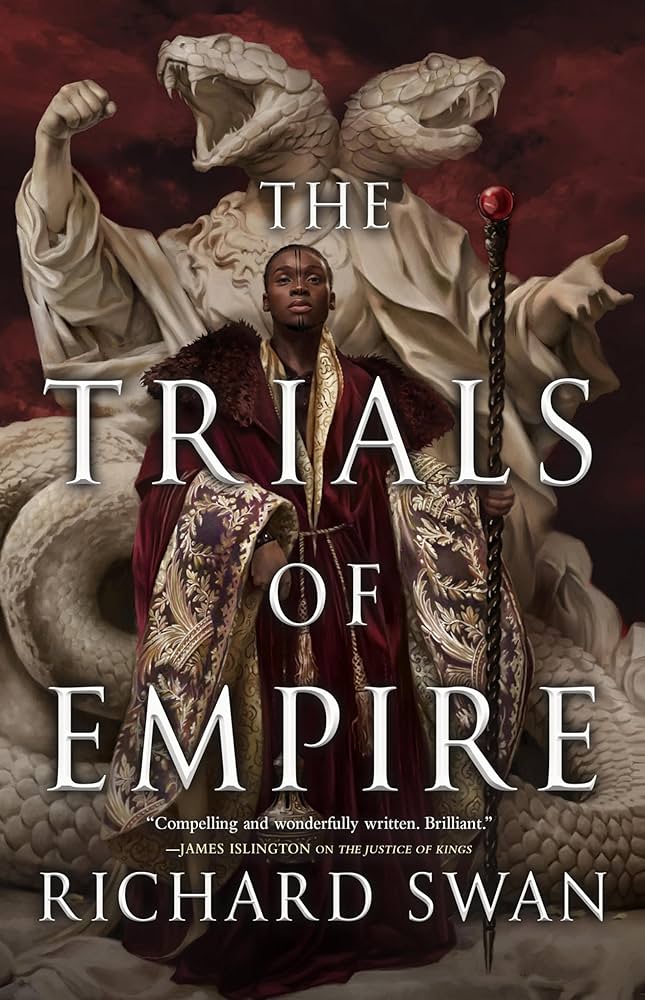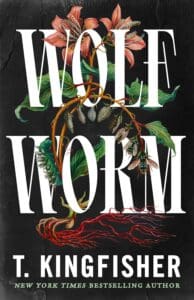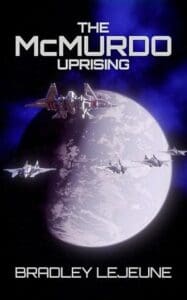
Synopsis
The Empire of the Wolf is on its knees, but there’s life in the great beast yet.
To save it, Sir Konrad Vonvalt and Helena must look beyond its borders for allies – to the wolfmen of the southern plains, and the pagan clans in the north. But old grievances run deep, and both factions would benefit from the fall of Sova.
Even these allies might not be enough. Their enemy, the zealot Bartholomew Claver, wields infernal powers bestowed on him by a mysterious demonic patron. If Vonvalt and Helena are to stand against him, they will need friends on both sides of the mortal plane—but such allegiances carry a heavy price.
As the battlelines are drawn in both Sova and the afterlife, the final reckoning draws close. Here, at the beating heart of the Empire, the two-headed wolf will be reborn in a blaze of justice . . . or crushed beneath the shadow of tyranny.
Review
“Can a person ever truly be one thing to you? Fully friend or fully enemy? In the same way two nations at war might still covertly trade, do our friends not smile at our misfortune, too? Even but once, in the darkest, quietest hour of the night?”
Here it is. We come to the end at last. I feel like Frodo surrounded by fire and crashing volcanic rock, declaring “It’s done!” The Trials of Empire has been one of my most anticipated books since its announcement and I was lucky enough to have been offered an arc by the author himself! Thank you, Richard, for being a scholar in the necromantic arts and a gentleman.
Let’s get to it, shall we. Trials of Empire has the pace of a topless blender. There’s food everywhere and you don’t know where to start cleaning first. It’s on the ceiling, it’s in the grout, and somehow, it’s in your ear. Chaos is the word, and this remains a theme throughout the book. It’s organized in the way of storytelling in that one action leads to a consequence, but that consequence has sentience and decides to make everything as messy as humanly possible for both the reader and the characters.
As I have stated many, many times, I love the craft utilized to build this series. The prose is excellent, and the world is interesting, but it is the way Empire of the Wolf is written that has captured me since I first read The Justice of Kings. The idea that this is the story of Konrad Vonvalt, but told through the eyes of his clerk Helena took over my brain and ever since I have moments of blackout when hyping the series up to other readers. The complex relationship between the two and the blurred boundaries of their ever-teetering power dynamic is really what made Empire of the Wolf a late nighter for me. Throughout the series I often forgot that the story is told in first person because Helena is so astute in sensing Vonvalt’s idiosyncrasies and moods, but with this installment Swan makes certain we know that these are entirely two different people. I love how the emotional and psychological separation between Vonvalt and Helena is slowly built until we can no longer recognize Vonvalt because she no longer can. It proves to me that not only is Swan well versed in building his characters, but he also has no qualms against tearing them down.
I know quite a few people were not entirely pleased with the way that Helena’s and Vonvalt’s relationship developed in The Tyranny of Faith, but I for one loved it. I am happy with the dedication Swan took to flesh out their complexities in this installment, even if it wasn’t necessarily as far as I would’ve liked. And by far, I mean I would’ve liked to understand a little more how it was almost not talked about at all. It was pretty clear from the start of The Trials of Empire Helena’s state of mind concerning the former Justice and I had a hard time matching it up to how The Tyranny of Faith had led me to believe her stance. I think it progressed exactly as it should’ve in this novel, but the bridge between The Tyranny of Faith and The Trials of Empire seemed to be missing a plank of wood to complete the transition. But as I stated, I am pleased with how it was eventually shown through the devolution of a wildly powerful and imposing character. The writing for this transition is phenomenal! I loved reading the absolute trainwreck that is their rise and fall. It hurt me good.
Imagine in your mind, for a moment, Swan meeting with his editor:
Editor: How much horror is in this book?
Swan: Yes.
And end scene.
Simple really, isn’t it? Fans of fantasy horror are going to love this book! It is intense! I’m shocked that the characters who survived the end of this novel retained any sanity at all. I’m talking demons, a bloody afterlife, horrific science experiments, Mel Gibson’s Apocalypto, possession, rituals, hallucinations, and every bodily fluid imaginable everywhere all the time. Just when you think it really can’t get any worse, it does.
The final battle is especially terrifying as Swan releases an arsenal of petrifying fighting sequences on both the mortal and spectral plane. I actually really enjoyed the way this one ended. It was not how I normally like my endings and I found it to be a breath of fresh air. The conclusion was satisfying and maintained the idea that this series was never Helena’s story.
There is some exquisite character arc candy here. Three Michelin Stars for being so yummy and making me want to come back for more. Swan has maintained a readership for this series, but with this conclusion to the trilogy, I believe there will be a lot of people coming back for what other books he has plotting in that crafty storytelling mind of his.
Although The Tyranny of Faith remains my favorite of the trilogy, I think this finale is amazing and is going to sweep the fantasy community off its feet! The Trials of Empire is a fast-paced, necromantic, bloody horror story that will keep you awake at night wondering what is watching you from the dark corners of your room. Grab your swords and join the ranks, Swan is lighting the beacons and there are demons to kill.







Leave a Reply